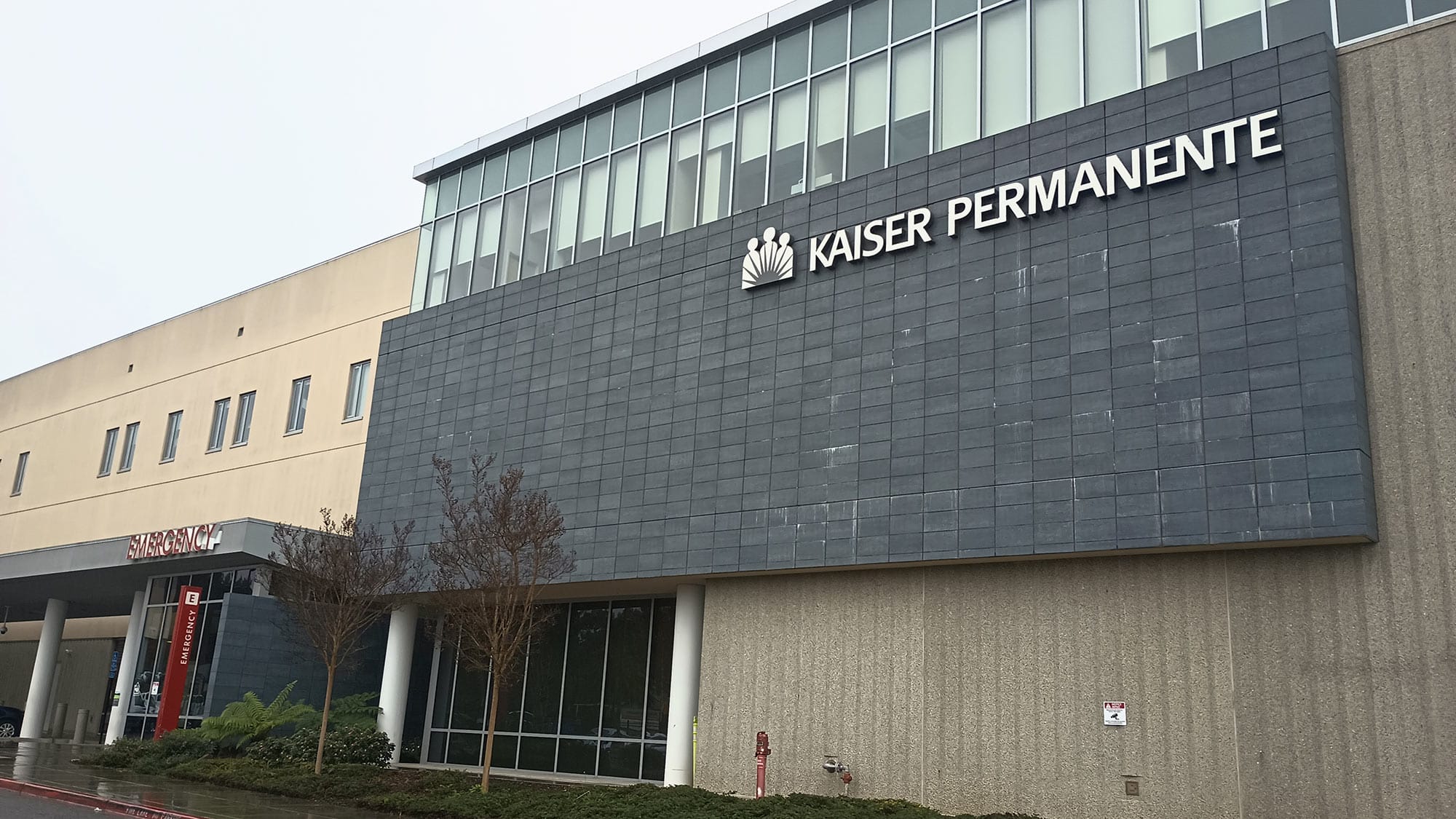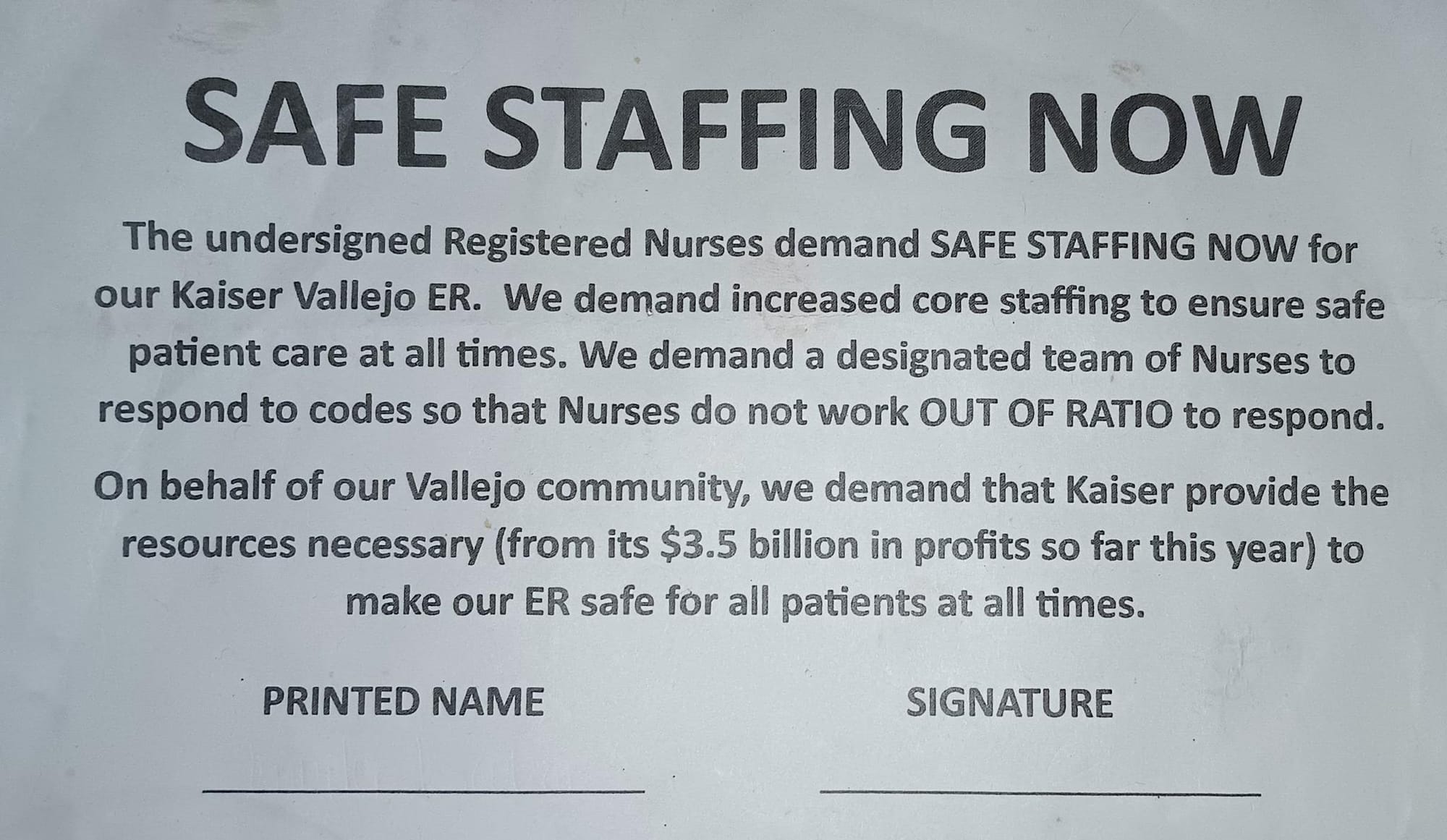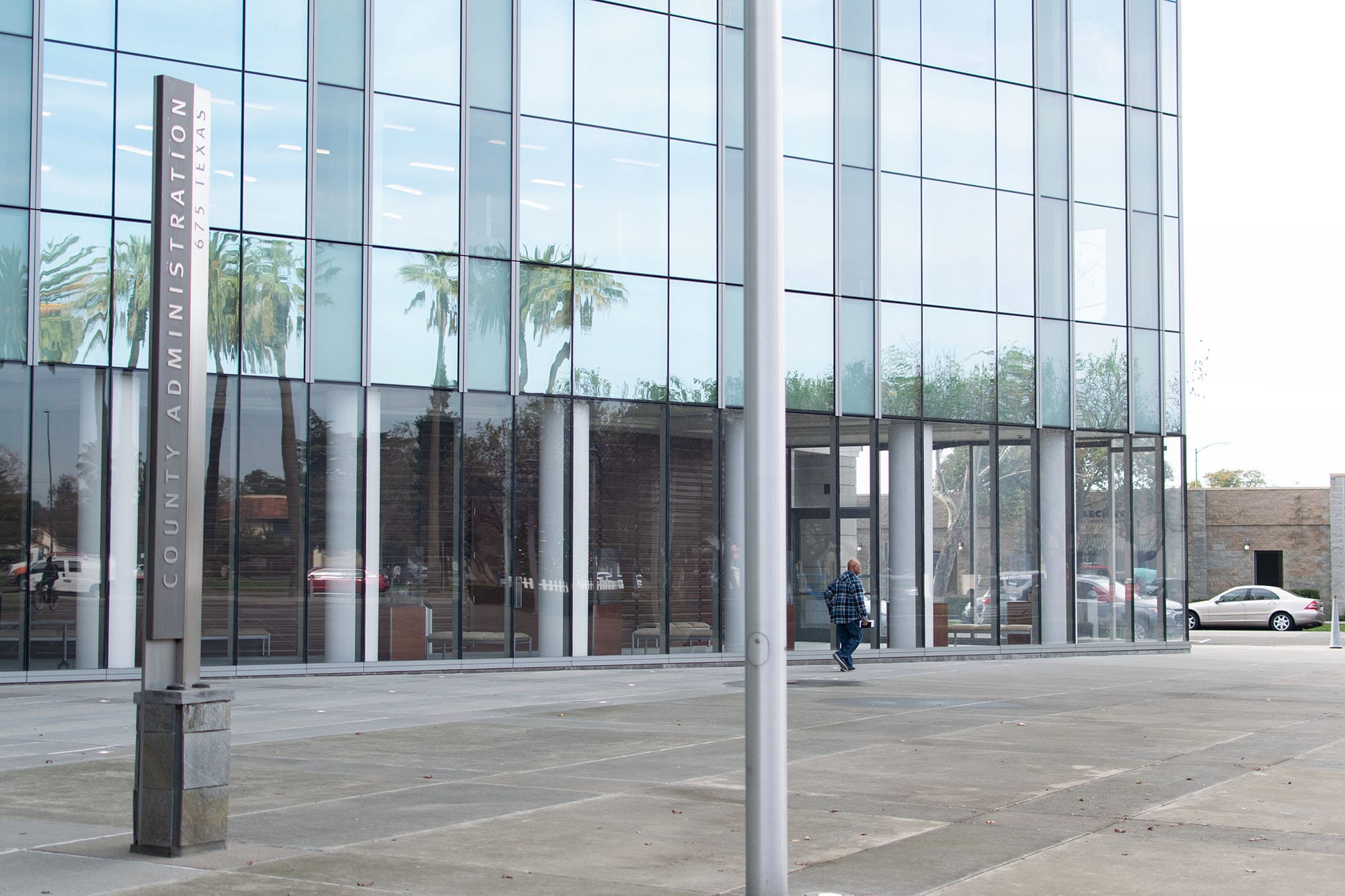VALLEJO — A man suffering from chest pains died in the Kaiser Vallejo emergency waiting room earlier this month after a lengthy wait without treatment in an incident that has raised concerns about the hospital’s ability to properly treat patients amid a staffing shortage in its emergency room.
Fifty-three-year-old Francisco Delgadillo Machuca, who went by his nickname Pancho, drove straight to Kaiser Vallejo from his job in San Rafael after his chest pains started on the afternoon of Dec. 8. He waited in the emergency room for eight hours without treatment until he collapsed at around 11:30 p.m. His family was notified he died at around midnight.
Delgadillo Machuca’s death happened just three days after Kaiser Vallejo emergency room nurses circulated a petition demanding that the hospital increase staffing to ensure safe patient care.
While Kaiser is a nonprofit private hospital intended for use by the organization’s membership, Kaiser Vallejo’s emergency room is the largest in the city and essentially serves as a county hospital, with many of Solano County’s uninsured and Medi-Cal patients going there for care.
Raquel Benito, the California Nurses Association union representative for Kaiser Vallejo’s emergency room nurses, told the Vallejo Sun that low staffing frequently means there is no triage nurse available to monitor patients in the waiting room, and that 10-hour wait times are common.
She said that understaffing of Vallejo Kaiser has been going on for years, and their complaints to Kaiser management have been ignored. She said that these conditions are also emotionally stressful for nurses who are frustrated about being unable to adequately help the people they want to work to serve.
Kaiser Permanente spokesperson Chyresse Hill said that Kaiser extends its “deepest sympathy” to the loved ones of the man who died and has reached out to offer support, but said that she could not comment on an individual patient out of respect for their privacy.
“We have rigorous quality review processes in place and take seriously any concerns,” Hill said. “As an organization dedicated to continuous improvement, we always seek to understand more, investigate thoroughly, and in partnership with our staff, take any steps needed to improve.”
Other Kaiser patients experience difficulty getting treatment
Delgadillo Machuca’s death came amid increasing concerns over the ability of Kaiser’s emergency room to properly treat patients.
Another patient told the Vallejo Sun that Kaiser also didn’t treat him promptly when he was suffering from a heart attack just a week before Delgadillo Machuca’s death in the emergency room.
Charles Barton said he went to the Kaiser Vallejo emergency room for chest pain on Dec. 1, He was given an EKG and a blood test, and sent back to the waiting room.
His chest pains subsided after about an hour. There were no nurses in the waiting area to check in with, so Barton thought he might only have indigestion. He left the hospital and stopped to buy antacid on his way home. But a friend who recently had quadruple bypass surgery happened to phone him and convinced him to return to the hospital.
When Barton was finally seen about two hours later, he was told he’d had a heart attack.
Barton said he expected that if the Kaiser staff thought he could be having a heart attack they wouldn’t have sent him back out to the waiting room. “If I knew what it was I wouldn't have left,” he said.
Benito, the union representative for Kaiser Vallejo’s emergency room nurses, said that nurses have been complaining for years to Kaiser Vallejo management that short staffing leaves them unable to do their jobs. She said the Vallejo emergency room is budgeted for only six nurses, but should have 12.
Kaiser nurses have been so concerned with the issue that they began circulating a petition to demand safe staffing levels on Dec. 5. “We demand increased core staffing to ensure safe patient care at all times,” the petition states. “On behalf of our Vallejo community, we demand that Kaiser provide the resources necessary (from its $3.5 billion in profits so far this year) to make our ER safe for all patients at all times.”
Delgadillo Machuca called 911 from the ER before he died

Delgadillo Machuca phoned his oldest son, Francisco Delgadillo Luna, from the emergency room at around 4 p.m. on Dec. 8. After his son arrived, Delgadillo Machuca told him that he had been given an EKG and a blood test and sent to the waiting room.
Delgadillo Luna said in an interview that his father was sweating heavily and complaining of chest and back pain. He checked in with the clerk who told him his father was number 29 in line. Delgadillo Luna then phoned his brothers and asked them to bring their mother to the ER.
By the time the rest of the family arrived, the elder Delgadillo’s pain was getting worse. They stepped outside and called 911. A fire department truck arrived at about 5 p.m., but the firefighters told the family they couldn't tend to the father on Kaiser property. They said they could take him someplace else, but that Kaiser has an excellent cardiac facility and he was best treated there.
One of the firefighters went into the hospital and talked to the clerk. Delgadillo Machuca was then taken to the back, given a blood pressure test, and returned to the waiting room 10 minutes later.
The family checked his number in line every 30 minutes, and witnessed other people come into the emergency room and immediately be taken into the back.
“This was still happening until 11 p.m.,” Delgadillo Luna said. “Well, my father couldn't take it any more. We were just walking inside the lobby, giving him back rubs to make him feel more comfortable.”
At around 11:20 p.m., when the graveyard shift was taking over, Delgadillo Luna said he checked in with the new clerk and found that his father was number 5 in line. “We were all glad, relieved,” he said.
He said he asked the new clerk if his father’s case could be expedited. But it was too late. “I saw my father just collapse,” he said. “I ran out to him, trying to support him, while hearing his last breath go out.”
“My mother starts yelling, throwing bottles, trying to get attention," Delgadillo Luna said. Within five minutes he said about 10 nurses came out. “And they start working on my father, but my father was already gone,” he said.
A woman who witnessed the ordeal said that she could tell that Delgadillo Machuca was in agony. Carmen Bazurto brought her mother to the emergency room at around 6 p.m., and was waiting in the same room as Delgadillo Machuca and his family.
“He was just pressing himself against the wall, and then he would sit on the floor, he would lay on the floor, and then he would get up – but he was just in pain.” Bazurto said. “He was not able to just sit still because he was in so much pain.”
Bazurto said that no hospital staff came to check on the people in the waiting area. At some point the Delgadillo family went back to the main lobby.
“And all of a sudden, like around eleven, we hear screams,” Bazurto said. She went out to the main lobby and saw Delgadillo Machuca collapsed on the floor. “He had passed away,” she said.
Bazurto said that Delgadillo Machuca’s wife was screaming and banging on the door and telling the nurses, “He had told you he's in pain, he's in agony and you guys didn't listen to him and he's dead now!” She said that a minute or so passed before one of the nurses came out to see what was going on.
Bazurto said Kaiser staff didn’t perform routine checks on people in the waiting room until after Delgadillo Machuca died. “We had been there from six and they didn't come check on my mom at all until after the death, which was like at 12.”
“It took until he passed away for all of us to get some attention. Every three hours they were checking vitals on everybody, and ‘Oh, do you need a blanket? We're sorry you're out here for so long,’” Bazurto said. “Now you get to send people out here to talk to us and interact with the patients and ask them if they're okay or not, when before nobody was even talking to anybody? This is how we get acknowledged, because somebody died - that's not okay.”
Bazurto’s mother was not seen until 8 a.m. Saturday, after a 14-hour wait.
Dean Compton, Delgadillo Machuca’s brother-in-law, said he arrived at the emergency room after midnight. He said he spoke to the head nurse and tried to get answers about what tests they had performed.
“I have two co-workers the same age as him, the past couple of years that suffered heart attacks and got attention, and they're back to work,” Compton said. “Pancho should be here with this family. It's Christmas time.”
Compton said he’s known the family for about 20 years and described Delgadillo Machuca as a happy, helpful and hard-working man who was close to his family.
“He's come to our home several times to help us with home projects and he's helped his kids with homework, and he's always home every night,” Compton said. “He's an integral part of the family. I'm gonna miss him.”
Delgadillo Machuca’s wife, Maria DeLaLuz Luna, said her husband was her life force.
“The children depend on him and there's no amount of money that's going to replace that,” she said. “He was my pillar, my strength, and everything, and I want justice to be done, because this is not fair. They left him to suffer for so many hours with his pain, they didn't take care of him. I don't want this to happen to more people.”
‘A health desert’

Benito, the emergency room nurses’ union representative, said that Kaiser’s short staffing of the Vallejo facility is a serious breach of its stated mission of health equity.
“We don't meet that mission at all, because we are not able to include and we are not able to treat everyone equally,” she said. “We are failing our own mission.”
“We signed up to take care of people, so allow me to take care of people,” Benito said. “That's what my job is, but you're not allowing me to do that. The way that they are running this ER is failing the nurses, but it's also failing the community.”
Kaiser staff nurse Patrick Williams Rodriguez described Vallejo as a “health desert,” with only the Vallejo Kaiser and the smaller Sutter Solano hospital serving Vallejo and much of Solano County.
Hospitals are required by federal law to provide treatment to anyone seeking emergency services, regardless of their ability to pay.
“There is no county public health care in that area, so it's on Kaiser and Sutter to take care of all the people,” Williams Rodriguez said. “Vallejo in particular is woefully understaffed when compared to other places. I myself have worked in three different Kaisers, and each of those definitely have better staffing than Vallejo does.”
Williams Rodriguez said that a Kaiser doctor told him that Kaiser’s staffing formulas are based on membership.
“In Kaiser San Francisco, about 92% of the patients that we take care of are Kaiser members, whereas in Vallejo it's more like 50%,” he said. “So given that Vallejo has a lower percentage membership-wise than other places, then that would mean that we're going to get less funding for our staff.”
But Kaiser Vallejo’s low staffing levels affect Kaiser members and non-members alike. All of the patients cited in this story have Kaiser memberships. And the situation leaves Vallejo, one of the poorer communities that Kaiser serves, with more tenuous care.
“I don’t think that you’d feel comfortable knowing that it's that tenuous, that the care that you get might be literally dependent on whether or not somebody called out sick today, or whether the manager wants a bonus at the end of the year,” Williams Rodriguez said. “I think that's nerve racking for anybody to believe that that's how tenuous the quality of care you, or someone you love, might get.”
Before you go...
It’s expensive to produce the kind of high-quality journalism we do at the Vallejo Sun. And we rely on reader support so we can keep publishing.
If you enjoy our regular beat reporting, in-depth investigations, and deep-dive podcast episodes, chip in so we can keep doing this work and bringing you the journalism you rely on.
Click here to become a sustaining member of our newsroom.
THE VALLEJO SUN NEWSLETTER
Investigative reporting, regular updates, events and more
- health
- labor
- business
- Kaiser Permanente
- Vallejo
- California Nurses Association
- Francisco Delgadillo Machuca
- Raquel Benito
- Chyresse Hill
- Charles Barton
- Francisco Delgadillo Luna
- Carmen Bazurto
- Dean Compton
- Patrick Williams Rodriguez

Gretchen Zimmermann
Gretchen Zimmermann founded the Vallejo Arts & Entertainment website, joined the Vallejo Sun to cover event listings and arts and culture, and has since expanded into investigative reporting.
follow me :




